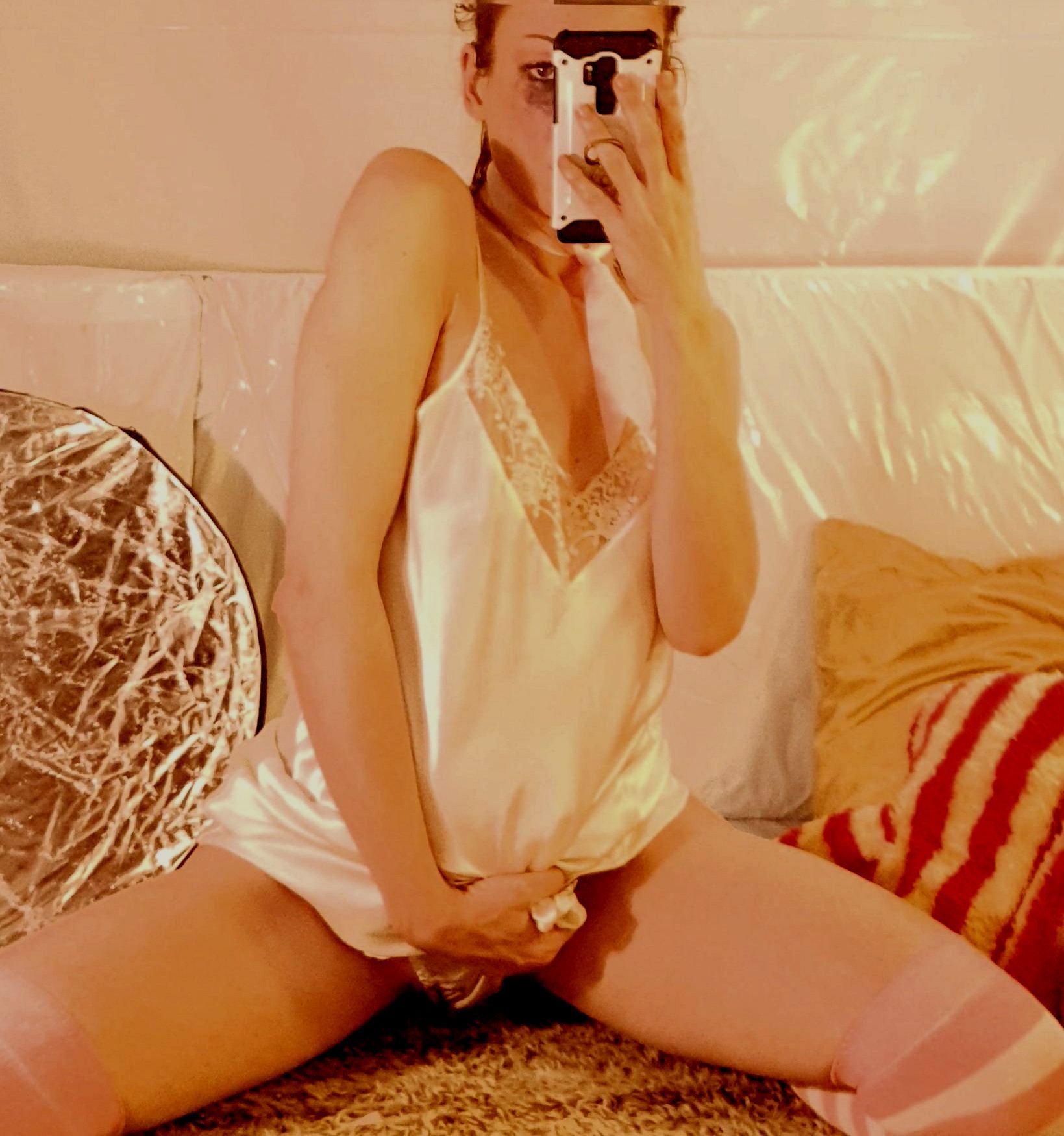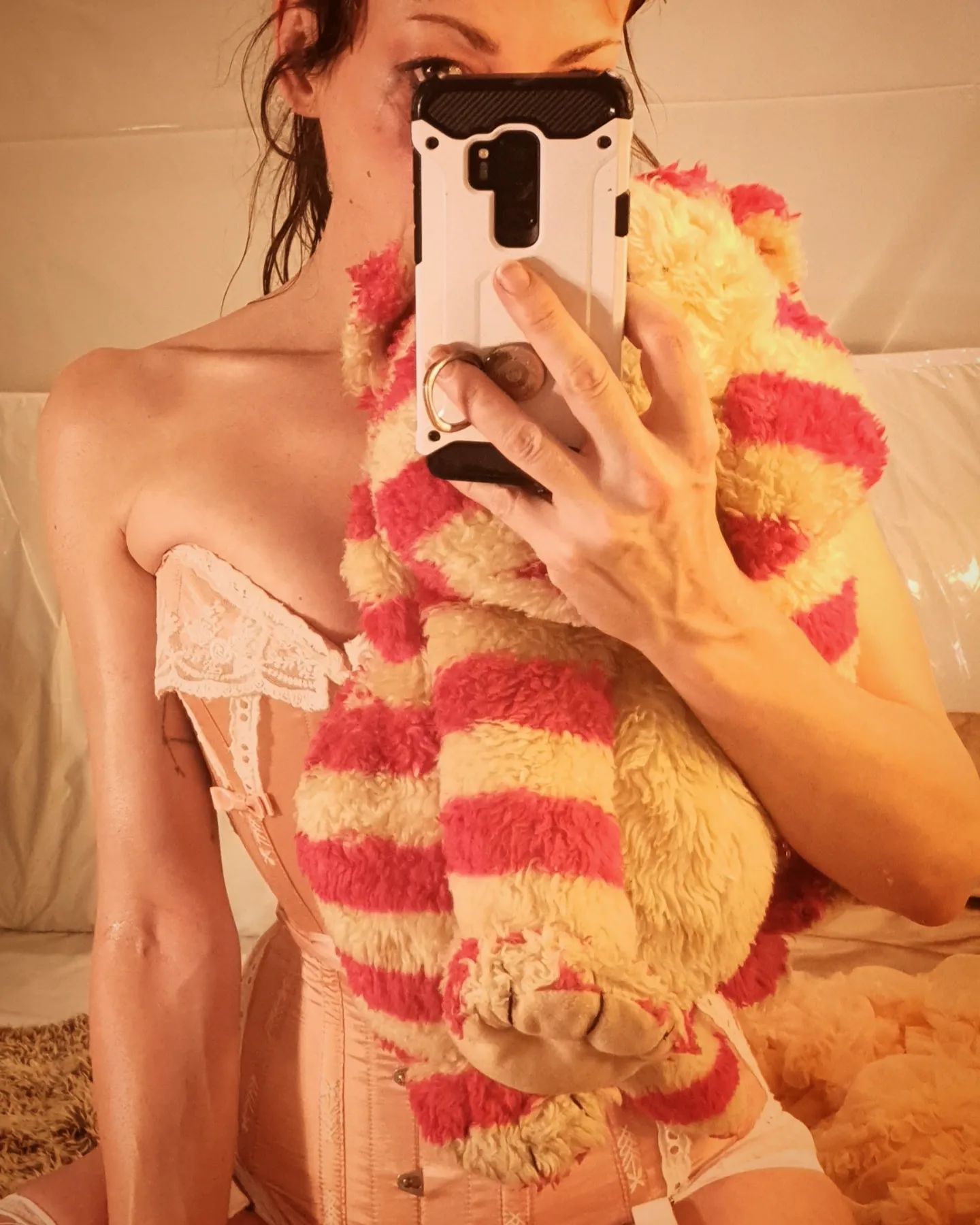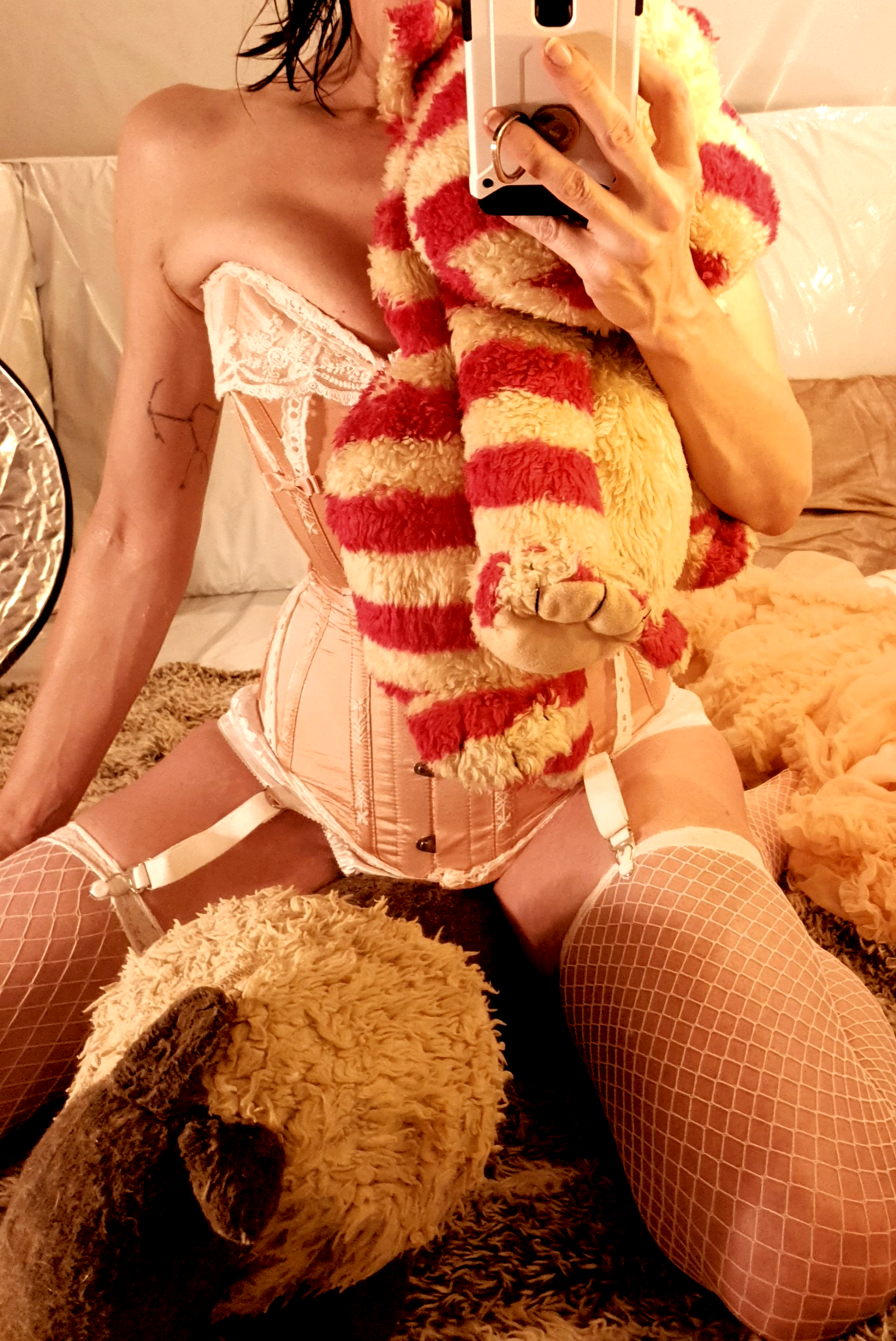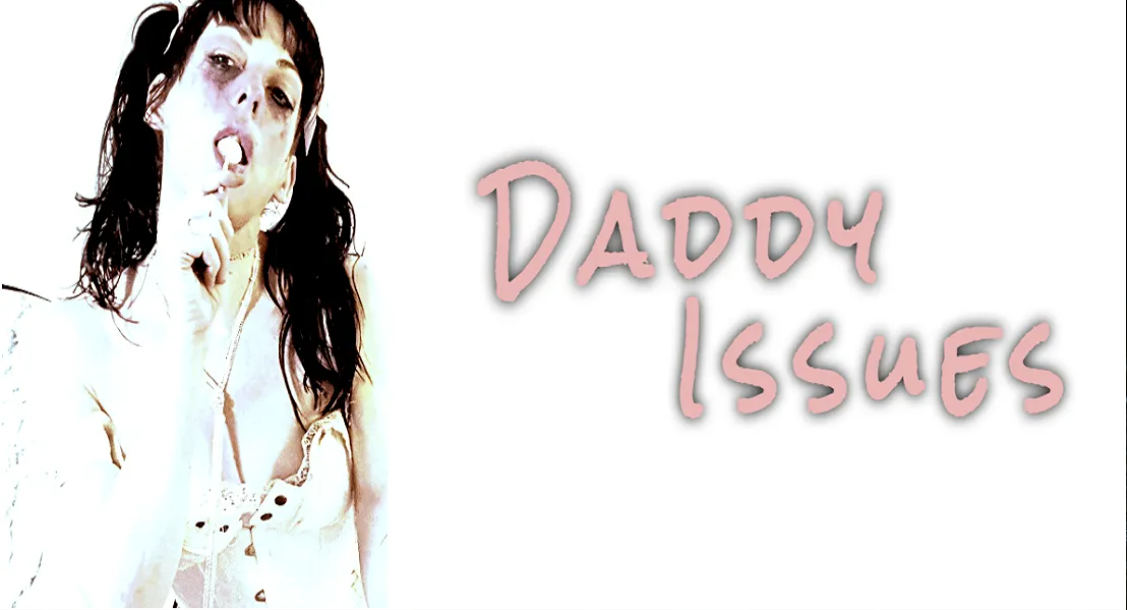
Daddy Issues
It's time to stop using women's childhood traumas as a means of attempted attack. Male, female or anywhere in between, this gloriously diverse society is well aware of the issues surrounding chosen male behaviours in the shadow of Incel culture.
We know it's 'not all men' and that there are some good ones out there. We also know that too many children are living fatherless lives through no fault of their own.
The term 'Daddy Issues' is a misogynistic and common insult used online by people who should know better - and here's why...
The PITs
I was born and grew up in a time when society was, once again, changing. It was the era of divorce, of women taking control, buying their own homes, getting educated at later ages and raising their children as single parents.
It was the time of films like 'Kramer v Kramer' and ongoing female empowerment.
Apparently.
In my early twenties, The Spice Girls came along and a new brand of Postmodern Feminism arose - one that saw females able to wear what they want, drink what they want, say what they want and work where they want. It was the time of Girl Power and Ladettes. The internet was yet to develop outside of the educational and commercial arenas and, while we still face the age-old issue of unwanted advances and our boundaries being broken by males who didn't like women but who wanted to fuck women, there was, at least, some sense of optimism about being female, which was a welcome chink of light in Generation X's otherwise shadowy and dark future.
Gen Z are not only group to have faced an uncertain and pessimistic future, but that's another debate...
Fast forward to 2023, and violence and aggression towards women and girls seems to have met another high, with male keyboard warriors trotting out childish, baseless and hateful comments born of nothing more than insecurity, loneliness and a lack of willingness to concede that it is them, and they could change if they so matured and decided.
But, no.
If a video is posted online of a conventionally attractive female, especially if she appears to have a single gram of self-confidence, chances are the so-called Men[babies] Of Culture and the like feel compelled to write insulting comments. Sadly for them, they're too entitled, triggered and unintelligent to understand that they're only showing themselves up to be toxic characters who women should avoid at all costs. They're also too wrapped up in their own neurosis to realise that we can and do check men out online like sleuths. Yes, we see you.
And this is why you are alone...
In this female body, I have batted off unwanted advances since I was a toddler. Yes, a toddler.
Let that sink in.
I have escaped as a tiny 11 year-old from a 16 year-old male who was on top of me and had pinned me down, trying to get into my trousers when I thought we were all just playing Hide And Seek. At 14 a 24 year-old soldier took me for a ride in his car and would have made advances had my military cousin not threatened to rip him limb-from-limb...But who still let that car ride happen.
At 14 (again), I had to push a 35 year-old man away after he circled his tongue on my cheek, just missing my mouth because I turned my head away just in time.
Through my late teens and into my twenties, I encountered men who were meant to care about me. Who professed to. But who also were happy to use emotional coercion to secure sexual intercourse.
I have laid there with tears trickling out of my eyes while 'he' was above me doing what he wanted to do - even after seeing my tears. I have walked through a bar in the afternoon and had a man I do not know put his hand between my legs with such force, he pushed my clothes into my body.
The friend he was with? He laughed.
He laughed at a sexual assault.
Me?
Shaken and in tears, I left my lunch, went home, and didn't go out again for along time.
In my Twenties, I was a bet to one group of friends who put money on whether or not one of them could get me into bed.
In my thirties, I had men doing things they were told not to do while I slept, things they denied. Things they blamed me for. How could I have done anything while sleeping? Even as a fully formed adult, I have had men do things they were told not to do.
My Forties? There has been disrespect here too. Less so than in previous decades because for the last ten years, I have largely avoided first-hand contact with men.
All in all, though, this means that in every single decade of my life to date I have experienced sexual abuses and disrespect at the hands of males. Every. Damn. Decade.
A common response to women sharing their experiences like this is that we 'need to choose better men', as if we had purposely chosen to be hurt and abused. As if we knew these men would do what they did. This very idea takes all and any responsibility away from the men who choose to abuse and assault. It invalidates victims.
What if some of us females are not equipped to read and react to red flags? What if we were never given the tools to help protect us from men who see as nothing but holes and lumps?
Because, often, the troubles and emotional anguishes are, unwittingly or not, created, enabled and perpetuated by the one man meant to respect, love and protect us. The one man who is meant to teach us what to expect and accept from other males - our very own fathers.
And, if they're not around or attentive, the results truly can be the PITs...
PIT, or Parental Investment Theory was the brainchild of Robert Trivers in 1972. The upshot is, the more a parent invests in his or her same-sex child, the less likely that child is to then go on and have unhealthy sexual behaviours and relationships. In this context, we're looking at fathers and daughters. This is not to say that boys are not also badly affected by poor or absent fathering. For the sake of this discussion, though, we're sticking to daughters and Dads.
But before diving further into PIT, we're making this personal.
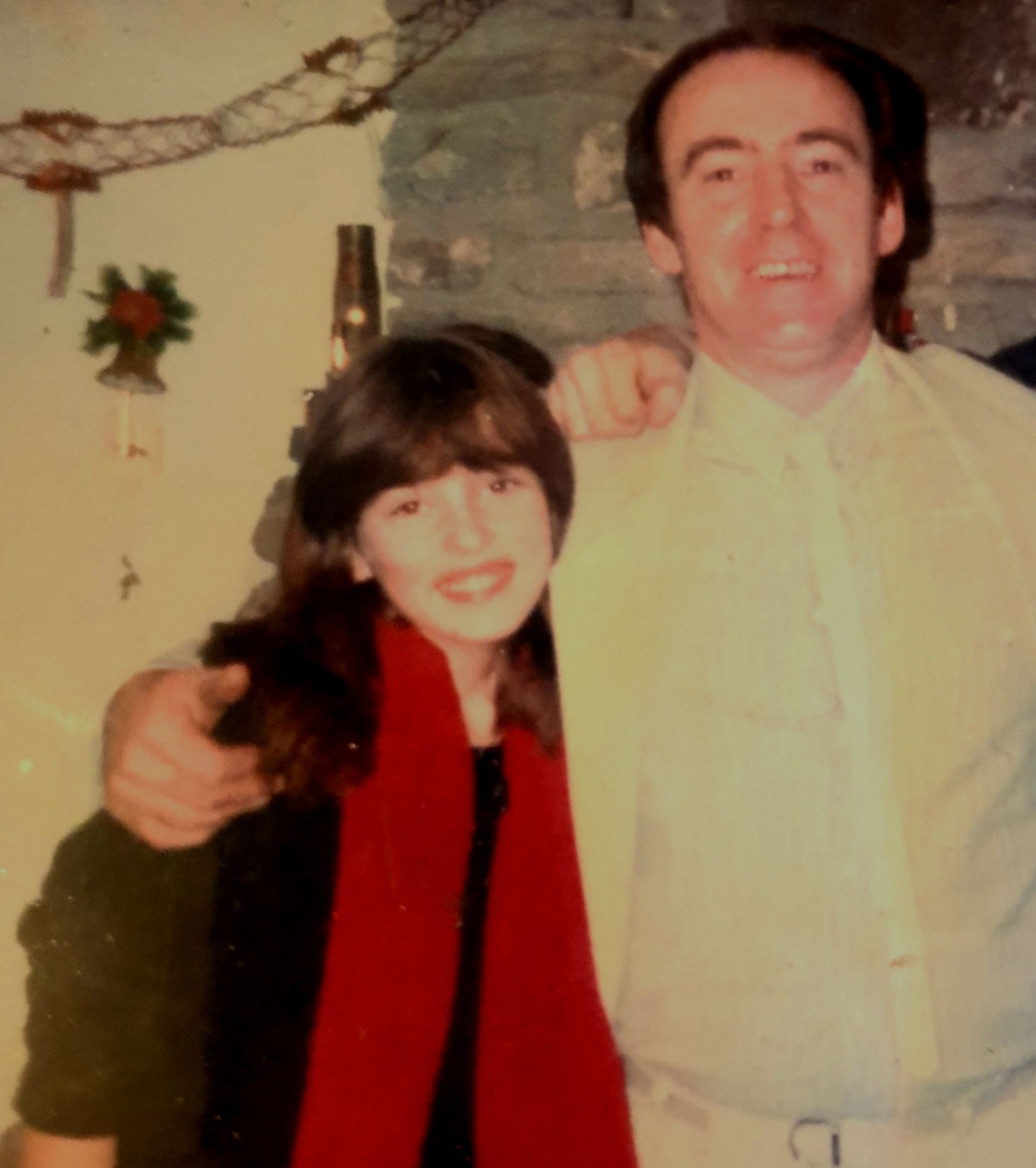
I would pick the dead skin, peel it in big patches that sounded like cling-film being pulled from itself.
I was just grateful to be having his attention
and time.
Daddy's Girl
For me, few memories exist of my father living at home with us. My parents' divorce was finalised when I was just five years-old. I do recall him being pinned against a wall by a car he was working on that rolled down a hill.
I remember his snore reverberating through the house like an articulated truck sitting outside my bedroom window, rumbling in the night.
I remember him driving the car to hospital to get me stitched up after an accident I still bare the scar from. Other than these three things, there is little else.
During the separation and throughout the divorce, my father lived with my Great Aunt Flo, who loved him as if he were of her own womb.
My brother and I were always welcomed and loved at her house, surrounded by the many cousins from my paternal side of the family.
So many of us were there, we pretty much filled the village. There were nights I'd sleep in my Dad's bed, staring as his back, which seemed so big and broad to me. I adored him.
Not a particularly tall man, he still seemed like a giant to me. In the summer when his skin was burned from working on roofs, I would pick the dead skin, peel it from him in big patches that sounded like cling film being pulled from itself. I was just grateful to be having his attention and time.
When he was working on the lorries, he'd leave my Great Aunt's house in the early hours, and I would sit with him, upset, begging him not to leave.
Or, at least, to take me with him. He couldn't. A cab is no place for a six year-old to sleep.
When I was seven or eight, he remarried. My stepmother was nice. Younger than him, she always seemed slightly nervous to me, about something. But, she never made me feel unwelcome and we shared some smiles.
I liked her. They moved nearer to the village where we lived, renting a house that used to be my dental surgery and that had a draw bridge in the garden that you could lower across the canal and raise by hand. I have a few more memories from this house than from my earlier childhood.
Sadly, they're not the sort of memories any loving and attentive parent would want their child to have of them, because they are recollections of upset and desperation.
It seemed to me that once my Dad lived closer to us again, I saw him less. In part, this is because he considered me to be 'difficult'.
Some nights I spent as his house,
I would become pathologically scared that something bad would happen to my mother while we are away from her. Still so young and trying to cope with the circus of adults around me, I would wake up crying and be almost inconsolable with worry and fear.
Rather than my father understanding that this was a trauma response and may be linked to Autism, he took a cold route, decided I was too difficult to have overnight, and so I was further pushed away by him.
He was meant to pick my older brother and I up every other Saturday. I remember sitting on the steps outside the row of cottages where I lived with my mother, dressed and ready for my father to turn up, so excited to see him again.
Some Saturdays, he just wouldn't turn up. Left me sitting there on those steps. Other times, he took my brother, but refused to take me. I remember those times.
I can still feel how it felt when he would gift my brother with things, then tell me it was my turn 'next time'.
A next time that would never come.
I also can still see the very young me riding her bike along the canal bank up towards his house, hoping he would see me, lower that metal drawbridge and let me into his paternal castle.
He didn't.
More often than not, nerves got the better of my tiny self, and I would stop around thirty metres from his home, lying down in the long grass, half-hidden and hoping to catch even a glimpse of him. Having been a parent for 21 years now, I can't help but feel protective over that little girl. I want to go back in time, pick her up, cuddle her and tell her it is not her fault. I want to stand in front of my father and make him explain.
Make him explain how he ever reconciled his behaviour towards me. How he ever felt it was fair or right to make that little girl feel the need to hide and spy.
When I got to high school, things didn't improve. They only got worse. We moved to a village four miles down the road and more often than not, the only time I really saw my father was when he drove past the bus stop on his way to work in the morning.
Sometimes he just waved at me as he drove by. Other times, I would feel special for a few seconds because he would pull over, dig out a handful of coins and give them to me. Even this paltry amount of attention from him made me feel special. How sad,
It was such a confusing time for me. Because while I felt like it was a fight to see him, he started calling in and having a tea with my mother once he'd driven by. Of course, I had childish hopes this would lead to a reconciliation between them.
It didn't.
My mother met a man who lived 20 miles away on a farm in the middle of nowhere. We moved to live with him. I hated it, initially. He was a stranger to me, and I found it hard to cope with his three children. A little chubby at the time, he and my mother told me to cut thinner slices of bread because I was a bit too big...I was 11.
When we moved there, my brother moved to my father and stepmother's house. He would not take me in, and my mother refused to let me go. What I wanted, I learned at a very young age, does not matter. I tried to make it matter.
Tried to talk to my father.
I can still see the headlights of an oncoming car hurtling towards us in the dark as we sat outside his house, me begging him for more of his time. Pleading for him to let me live with him. Thinking these oncoming headlights would plough into us, I tried to get out of his car, but he grabbed me, kept me in my seat. It's probably the only time I can recall him protecting me - even as he hurt me emotionally.
The last time we ever spoke, I was just 12 years-old. It was the same old story. My parents had discussed how unhappy I was at the farm, and they agreed that I could go to his house for the night every Thursday to give me a break from the new situation I was struggling with. Really struggling with. Throughout my childhood, my brother was the one I called for if I hurt myself or needed comforting. He was with my father and I missed him - more than he ever realised.
This new arrangement seemed like a chink of light to me. But it was only going to lead to more darkness.
On Tuesday 25th June 1987, my father cancelled my overnight stay. Again. He telephoned me at the farm to say that there was a party in a pub he wanted to take his wife to, so I could not see him that week.
To me this was heart-breaking. We argued. Once more, I found myself begging him for time. He refused. I hung up.
A few hours later, in the early hours of Wednesday 26th June 1987, he was dead.
He was only 41 years-old.
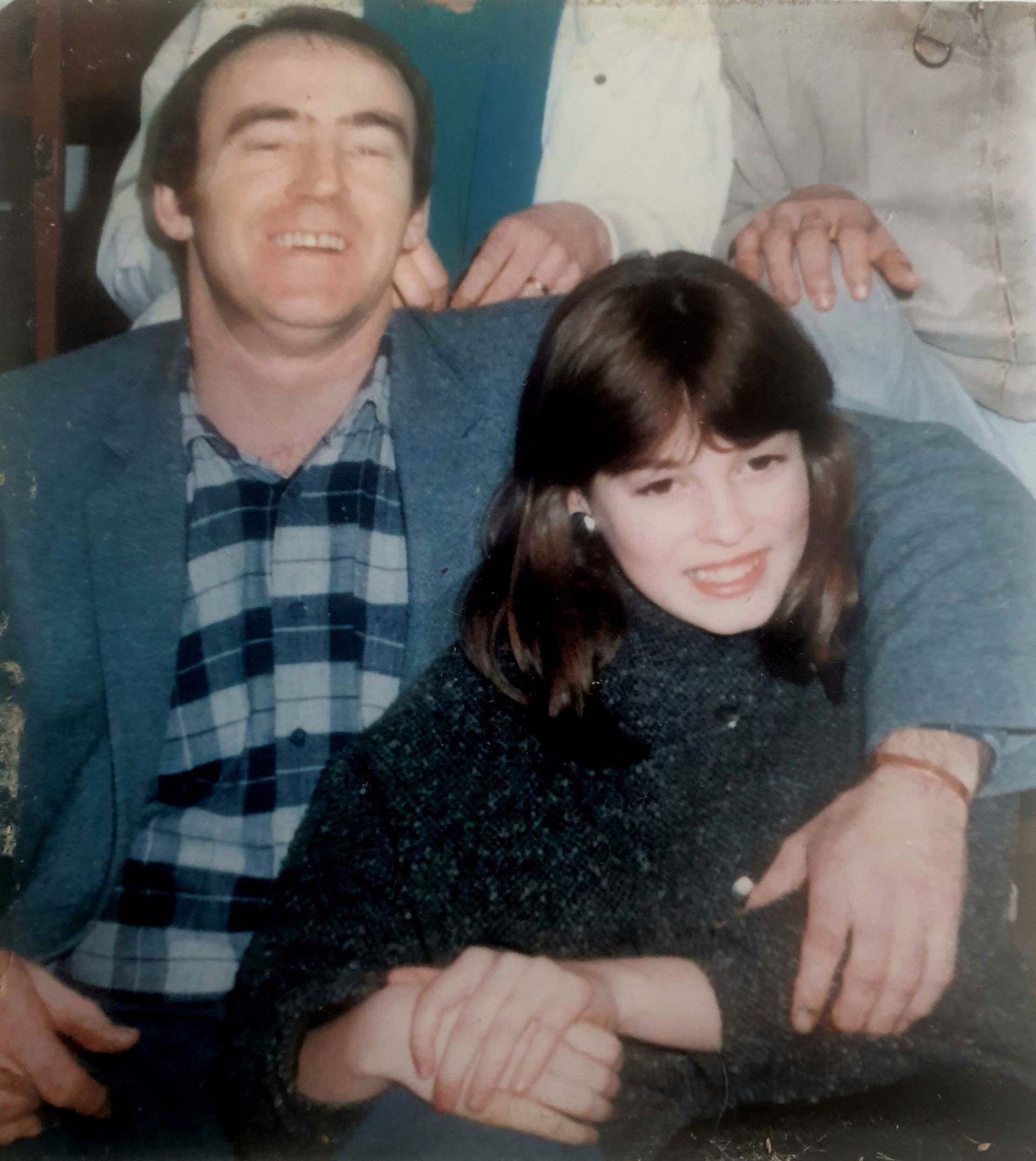
He was just another person around whom I trod
on tiptoe to avoid the eggshells beneath my feet.
Any glimpse of kindness
from him, I lapped up.
Aftermath
His death was sudden and unexpected. To me it signalled the end of all hope of escape and any life-change. It meant that I was always going to be living with my mother and whatever partner she had, and that I was never going to get to know my Dad.
I took a week off school in the immediate aftermath of his death.
I don't remember much of that time.
The day of his funeral is still engrained in my mind. It was a hot, sunny day, and so many people came.
The cars formed a long tail that followed the rest of the entourage as we wound our way to the church where the service would be held.
I arrived with my mother, wanted to sit at the back of the church so as to avoid walking by any more adults starting at me with pity in their eyes. With my face pushed into her, I managed to hide my face from most of them, but I could feel the weight of their well-meaning energy.
No, I did not want to walk to the front of the church, but my mother, always one for worrying about how things 'look' to others, all but dragged me down the little church's aisle to seats somewhere near the front, where my stepmother and brother were, in what she saw as a more fitting position for a grieving daughter.
After all, she has born his children, she should be at the front, too, with his new wife and widow...I remember whispering to her, that I did not want to go to the front, but since when did anything I say have meaning?
The wake was held at the house on the canal where he had died. Taking some time away from all those who were there, I sat, alone, in his blue car. It was like an oven, stifling in the sunshine.
I remember sitting there, somehow simultaneously feeling numb and a whole host of emotions I could barely handle, let alone put descriptors to. I found his library card in the little compartment above the gear stick.. I took it. Tucked it away.
Still have it, somewhere, hidden in my house to this very day. It was the only thing of his that I had.
Initially, my brother stayed with our stepmother, but eventually, he came to live with us on the farm with my mother, her partner and his children. Our relationship was never the same again.
There was no closeness. From then forth, my brother would only really communicate and interact with me if he had to, and when he had to, it was never really with any warmth of semblance of care or sentiment other than annoyance and reluctance.
He went from being the person I cried out for as a tiny child when I was hurt, to just another figure in my life who was never going to give me any sense of approval or acceptance. He was just another person around whom I trod on tiptoe to avoid the eggshells beneath my feet. Any glimpse of kindness from him, I lapped up.
Every tiny gesture that could have possibly signalled warmth or that he even liked me as a human was, to me, a sign of hope - hope that he one day would just be nice to me again and we could get on, have a relationship the way siblings do.
By the time my mother and her partner split up and we moved again, it was pretty obvious to me that my brother and I were not going to be building the kind of connection I wanted us to have.
One Christmas Eve, this became particularly clear to me after he spent a hour or two bent over me trying to talk me into self-harming and suicide. Over the decades since these times, I have tried to decide why, exactly, my Big Brother disliked me so much, when I only ever really adored him. It can only be, I think, due to a misguided idea that life was easier for me with my mother than it had been for him - witnessing the death of my father and unable to save him.
My mother is probably very much in the mix in terms of her children being divided.
That stems from her upbringing and her father, but that is another issue altogether...Suffice it to say this - my mother prizes the male above the female and watching her, like a cat in heat, turning on what she perceived as infallible female charm, as I grew-up trying to navigate my way through a dysfunctional family dynamic was difficult.
Very difficult, very damaging and very lonely at times.
Regarding my father and his death, I was just left to deal with it.
Deal with it, I did, though I'm not entirely sure how...School friends, nights out underage drinking, tobacco and Marijuana were certainly in my armoury against grief.
One of the harder things that nobody warns you about regarding death, is the way people say things about the dead person that make no sense to you. My father was pretty widely known because of his work as a builder, and a good builder at that.
I would stand, ears ringing
with some kind of rage,
but no expression on
my face.
These strangers may have known him, but the person they told me about was no father of mine.
Numerous strangers spoke kindly of him, his skills, who he was as a man after hearing that I was his daughter. While strangers told me how liked he was, how he always had time for a chat, all I could think of was the rejection I had felt from him since I was a tiny child.
I would stand there, ears ringing with some kind of rage, but no expression on my face, thinking of all the hours I spent begging him for more of his precious time...These strangers may have known him, but the person they told me about was no father of mine.
I'm not sure how you ever reconcile that, how you make the two realities balance. Maybe we don't. Maybe time ticks on and moves us away from the acute phases of heartache and heartbreak, and we just learn to dullen the edges of it all.
Or maybe, just maybe, while we think we have somehow covered the sharp corners in some sort of comforting balm, the truth is that the damage done to us by absent fathers is always evident throughout our lives, no matter how much we want to ignore it or leave it denied.
Responsibility
It's only now, as I reach the last half of my life, that I realise what a profound impact my father's absence has had on my life. In fairness to him, my mother's influence cannot be put aside as if she did not also damage me and the way I see people.
Between the two of them, there was no real success that they could claim as parents, other than birthing me and keeping my alive up until the point I became responsible for myself. Indeed, were my mother or my brother left to their own devices and will, I probably wouldn't be here and able to type this. But, let's stick with the importance of fathers and how their absence harms their daughters.
The old insult of 'Daddy Issues', often muttered or smirked in a woman's direction is a direct acknowledgement that a father failed.
If a girl or woman has or had 'Daddy Issues' it's purely because an adult and grown man who should have been there to raise, educate, love and protect her, failed on all fronts, causing some emotional distress and damage that is so strong in her brain and neurology, it has rendered her unable to make certain decisions in ways she otherwise would have.
Yet somehow, in this apparently increasingly misogynistic society, it is the younger women who are blamed for being damaged - at the hands of their paternal figures. It is the females who are, according to misogynists, expected to absorb the emotional abuse and emerge unscathed and completely able to read other men around her - no matter their intentions for her.
Or to put it another way that more men may understand...The young girl who was emotionally abused and damaged by her father's absence is more likely to be further used and abused by other adult males because her brain is unable to make sound judgment calls upon the other adult males she will encounter in life, who largely will wish only to fuck her.
Or, to put it in a more palatable and academic way, as stated by Hill, Leyva and Del Priore in their review of literature on this subject, 'Our findings provided consistent experimental support for a causal link between fathers’ investment and daughters’ sexual decision-making. College-aged women who described a time their biological father was absent demonstrated greater activation of sexual concepts and more permissive sexual attitudes.
For instance, women who described their father’s absence were more likely to complete a series of ambiguous word stems with a sexual word (e.g. completing _A K _ D as ‘NAKED’ as opposed to ‘BAKED’) than women who described a time their father was present and supportive during a time of need...[W]omen who described the absence of their mother or of a close friend did not demonstrate similar shifts in their projected sexual decision-making.'
So, not only did I have an absent father who died, I had a brother who seemed to dislike me at best and also abuse me emotionally at worst, and a mother who is...Complicated...Who had male partners that either were disinterested in my existence or who also enjoyed making derogatory comments about my appearance and weight, while telling me how attractive and sexually alluring my mother was.
Is it any wonder I was fucked-up when it came to men and relationships?
Getting male attention has never been hard -and that is not a brag. Many males give their sexual attention away like a cheap, nay, worthless thing. And as stated earlier, male attention started when I was a toddler and carried on from there, all through childhood, teenage years and adulthood.
Numerous men did or tried to do things with and to me that they should not have done or tried to do. The actions of another can never be the fault of the victim.
End of story.
But when it came to choosing sexual partners, the lack of a positive paternal role-model can and does have devastating affects on children as they go through life.
In the 1980s, Mischel et al documented how children from fatherless homes were less able to delay or defer gratification, seeking out more immediate pleasure and pleasurable responses/feedback than their counterparts who came from homes where two parents resided.
In 2006, Costello et al. concluded that poorer mental health outcomes were associated with children from fatherless families, including struggles with Depression and anxiety, and three years later, Kenny & Schreiner added to this with the finding that fatherless children are also more likely to drink alcohol than young people who are fathered consistently.
These issues and the others that were documented (such as increased likelihood of imprisonment and increased aggression towards other adolescents) are further compounded and made worse if the children in question also have a rocky relationship with their mother - meaning I hit the jackpot on the 'Parents - They Fuck You Up' front.
Unlike the recorded norm which states that daughters of absent fathers tend to do less well in education. I was a fairly high-achiever who never struggled with academia. Indeed, I was given extra work to do in certain high school subjects because I did well with learning.
To me, education meant a career, a career meant money and money meant escape.
What I did struggle with, though, was romance and sex.
My first two relationships were probably the healthiest and safest I've had in that they did not contain any emotional or sexual abuse. After that, and by the time I hit my Twenties, things started going awry.
The kind of mind-games and psychological nonsense (like lying and gaslighting) that I grew up with started showing in my relationships. I stayed with one partner and even moved to the Middle East with him simply because that was better than moving back into my mother's house.
The emotional and physical abuses I dealt with at the hands of this man were probably harsher than any other. He was not the first or last male who thought 'power' and 'masculinity' equates to ignoring consent...
After becoming a single-mother (which was likely a direct psychological impact of my absent father upon my sexual decision-making, according to Lummaa & Clutton-Brock, 2002), I spent a couple of years alone, just focusing on my son before reuniting with an ex I had known since my teens.
Again, big mistake.
Of course it didn't work, but we would keep trying and go around that block numerous times over the course of about thirty years before I would finally, once and for all, kick that man out of my life and never let him return. I guess hope is a big problem for women like me who spent their childhoods hoping their father would suddenly see them as deserving of time and attention, worthy of actually parenting.
Just as we hope that paternal figure will one day shape-up, we hope that feckless or unstable partners will do the same.
The last time I was part of a couple was ten years ago. When I ended that relationship after about eight years, I told him 'I will never have another relationship', and that is something I have stood by until this day.
It's not necessarily something I want for the rest of my life (I do get lonely), but when I ended that, it was as if scales were falling from my eyes and I was suddenly seeing the truth of, not only my love life, but also my earlier life in the middle of a dysfunctional family with generational issues that were,
and remain, undiscussed and badly hidden under various huge rugs.
Taking time to read and read and read about different personality types, the results of generational abuse upon various family members and dynamics, how to recognise certain forms of abuse and how to heal from it all, applied to my family but also to my relationships - facts that meant I could not trust myself to safely pick a mate.
Family, friends, partners...I'd been
programmed right from the start to
accept that my place was firmly below
that of anyone else around me.
Beyond that, the learning also had me examine the people around me who claimed to be my friends. I found parallels between all of my close connections and the people in them.
They all shared the same theme of them being dominant and the way in which they regarded me. For example, I had friends who would dominate conversations and talk at me about themselves for hours, while not returning the same courtesy of listening to me. Hence, they never really knew how I felt about anything - including them.
This dominance extended to the way other friends would decide when they were coming to see me and for how long they were going to stay in my house. Indeed, some acted as if they were doing me a favour by being around, rather than realising that their presence was just tiring me out and something I tolerated, rather than was grateful for.
Family, friends, partners...I had been programmed right from the start to accept that my place was firmly below that of anyone else who was around me.
What I said meant nothing.
What I felt meant nothing.
What I expressed meant nothing.
It was simply easier and safer for me to keep my mouth hushed, my head down and a false smile on my face.
Until it wasn't anymore.
Until I realised that I would be no more alone on my own, without family, partners or these 'friends' than I was with them all officially in my life. I used to think that my life would have been better if my father had not died.
But at that point where, research, learning and maturity kicked-in, I understood that it would have taken a monumental amount of reckoning on his behalf for him to have made any positive difference to me if he had lived. He would have had to have been able to hold his hands up and admit to his failings as a father.
We would have had to have been able to sit down and honestly discuss how absent he had been,. the choices he made that hurt and damaged the child version of me.
I don't know if he would ever have been able to confront himself to such depths. I don't know if he would have been able to acknowledge anything.
Maybe, had he lived and we had spoken, he would have done as my mother has, and denied it all - which can cause more damage unless to you if you're not very careful...
And, just as I decided to walk away from certain 'friends' and family, I decided to maintain a distance from sexual relationships with men. I cannot trust them.
More importantly, perhaps, is that I cannot trust myself to make correct judgements and choices about men. Looking for someone you can hook-up with and have a purely sexual connection with carries few stakes.
There is less hurt to be had if you have no plans on giving your heart away.
That may sound sad, but it's true for women like me who, from a young, young age, were psychologically damaged by the first man who was meant to treat us well, and keep us physically and emotionally safe.
So, did I and do I have Daddy Issues?
Abso-fucking-lutely.
This last decade on my own has given me time to know that and time to get to know myself inside out and upside down.
I have no problem admitting my vulnerabilities.
I am but human - one who was very, very hurt in the past.
But, is this hangover from emotionally abusive situations and paths taken by an adult man who chose parenthood, my fault?
Abso-fucking-lutely not.
And men using the results of childhood neglect and abuse as a way to insult women?
They vastly underestimate the importance fathers have, and should probably avoid becoming Dads.
